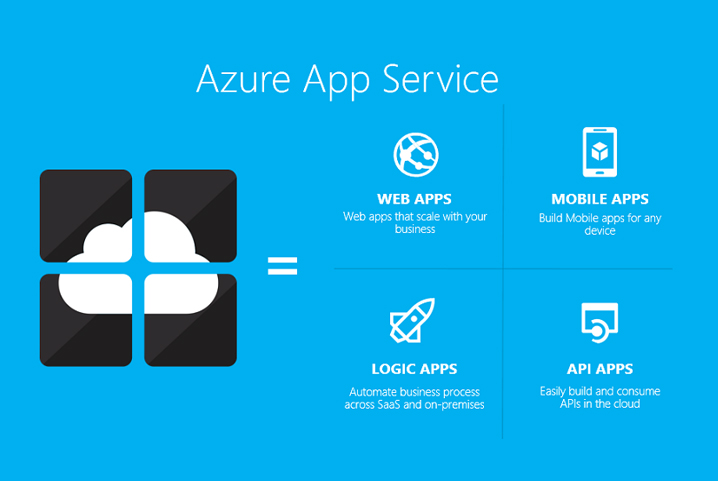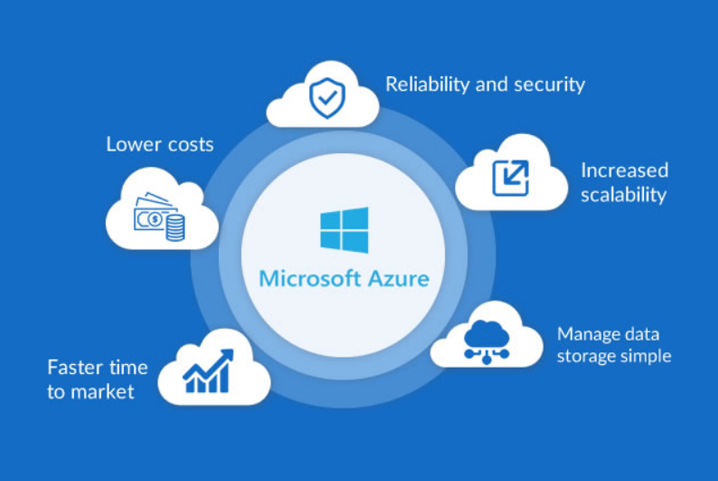In recent years, there has been a significant spike in average spending on cloud computing services. The main reason behind this is its economics and convenience. Cloud computing is the best and the most cost-effective way to get rid of all legacy IT bottlenecks, including hardware and monitoring costs. While there are many cloud service providers, Azure Microsoft happens to be one of the most popular and fastest-growing ones. It is second only to Amazon AWS, and the competition between the two has made cloud computing more accessible and beneficial for enterprises.
Azure offers 18 types of cloud products and services. Among these, the Azure App and Azure Cloud are the most preferred ones. Are you also willing to migrate to Azure cloud but confused? This blog answers all your queries and more.
Azure App Service
The azure app is a fully managed PaaS service integrating Microsoft Azure Websites, Mobile Services, and BizTalk Services into one. In a layman’s language, it is a way to automate your business efficiently and smoothly. Built on Microsoft’s ‘mobile-first, cloud-first’ philosophy, Azure App Service allows developers to focus entirely on APP/Website development while Microsoft takes care of all the infrastructure woes. Here are some of the highlights of the Azure App Service.
- Create and host web/mobile applications within seconds.
- Build engaging, OS independent apps.
- Tools to automate business processes/workflows.
- Easy app integration with cloud-based SaaS solutions like Office 365, Salesforce, Dynamics, Dropbox, etc.
- Easy integration with on-premise applications.
How Azure App Works?
Azure App makes use of a distributed systems platform (framework) for development, deployment, and management of custom applications. This distributed framework is also known as the Microsoft service fabric. One of the primary advantages of the service fabric is that developers can create, add, and update new features without having to do any additional back-end changes.

The Types of Azure Apps You Can Create
One can develop and host apps of all types and categories on the Azure app service. It offers all the tools and services to create apps that best fit specific business needs. Further, integration with Visual Studio Online, GitHub, automatic patching, staging, and production support makes development cycle agile yet very efficient. Here are some of the apps you can develop using the Azure App Service.
1. Web App
The web app is un-arguably the most popular Azure app service. With Web Application, you can create an enterprise-grade website within seconds. Further, you can also deploy Scale-out/load-balanced web apps. The platform is managed correctly and supports .NET, Java, PHP, Node.js, Python frameworks. Other key features include:
- Auto-patching
- Easy integration with TFS, GitHub
- Deployment slots, testing in production, Web Jobs and continuous integration
- Popular CMS tools like WordPress, Umbraco, Joomla, Drupal
2. Mobile App
In line with the mobility needs of a modern-day enterprise, the mobile app system by Azure allows users to build and host engaging cross-platform and native apps. These can be apps running on iOS, Android, Windows, or Mac. The development environment is ideal for creating large-scale enterprise-grade applications. Developers can use the platform from anywhere and anytime as well as leverage all other back-end cloud capabilities. Here are some of the features of Azure Mobile App service.
- User Authentication
- Easy access to Microsoft Azure, Azure AD, and Google services.
- Data (Structured and unstructured) storage and security.
- Invocation of Custom Code and Push notifications.
- Custom code for invoking integration services.
3. Logic App
The logic app allows the automation of business-critical workflows and processes.
You can use connectors and visual design tools to integrate multiple workflows, APIs, and data. Configuring workflows using visual tools is easy and intuitive.
4. API App
Azure API is an important component of the Azure App Service. It is an easy way to organize communication between multiple business apps. The Apps can be posted on both cloud or on-premise. Azure API App service is primarily used for SaaS connectivity, integration with other Azure App services, creating RESTful APIs, etc. API app also comes with security features like Active Directory, Single Sign-On, and OAuth.
Azure Cloud Service

Azure Cloud Service is the first PaaS offering to come out of the Microsoft Azure Lab and is a step ahead of Azure app service. In addition to all the features and capabilities of the latter, Azure cloud service gives greater control over the Azure VMs. This means you can schedule and manage workloads with greater control. However, managing complex workloads and VMs can give birth to deployment and monitoring challenges. In critical cases, organizations may have to hire expert services to ensure business continuity during peak hours.
Based on how the app is hosted on the Azure VMs, the cloud services are offered in two ways i.e., Web roles and Worker roles. In the web role, the app is hosted automatically via the Internet Information Services (IIS). On the other hand, worker role cannot use IIS and must deploy the app as a standalone. In simple terms, a web role is typically assigned for lightweight or straightforward applications, whereas worker roles are usually used for powerful applications and APIs.
Which One to Choose?
When it comes to picking between the two services, it is a choice between flexibility and simplicity. Cloud services offer greater control over apps but increase responsibility. On the other hand, with App services, you won’t have to break any sweat for application deployment. However, App service doesn’t provide provisions to install custom software on the VM. Moreover, they are not compatible with PHP, Python, Ruby, .Net, Node.js, and Java. These capabilities are available with Azure cloud, but they come at the cost of agility. Deployment is slow and added features like Event Tracing for Windows events, specific automated tasks during run time, etc. increase expenses.
To sum up, we can say that both are premium choices and both come with great features. However, the choice between the two is strictly a matter of control and cost. While cloud services offer more control, the deployment can be complicated and time-consuming. Businesses must first evaluate their current and future needs and then make a choice that best serves their needs. Pratham Software is one of the leading cloud service providers. With a team of highly experienced cloud architects and solution engineers, we help organizations make the most of Azure capabilities. Please visit the link to know more about our Azure migration offerings.









